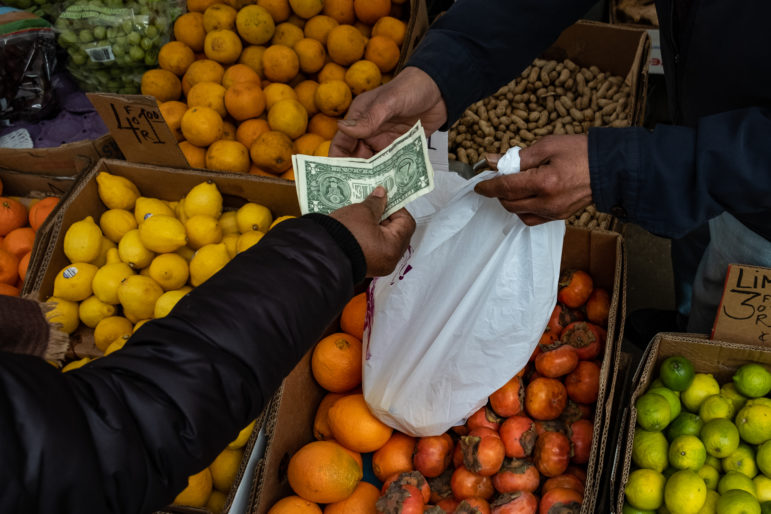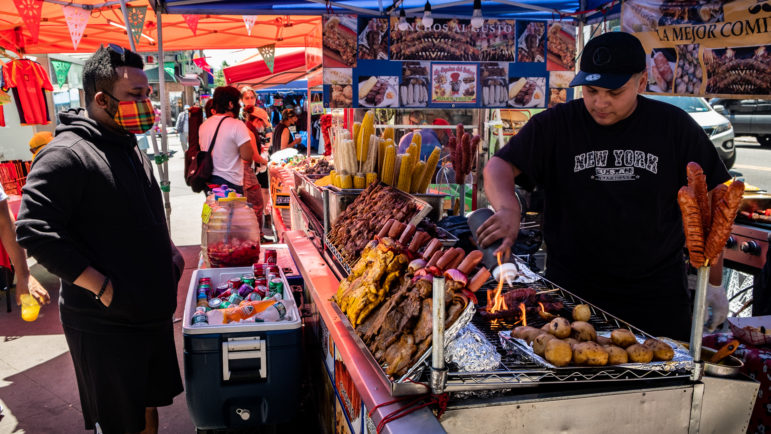Vendors and advocates say increased city enforcement is hampering the industry’s recovery, as workers continue to see fewer sales since the pandemic began.

Adi Talwar
Lea la versión en español aquí.
For the past decade, Miguel has sold catchy seasonal items on the South Bronx streets—winter hats, gloves, scarves for the cold season, and caps, toys, and flip-flops for the summer—and in less than a year, he has received three tickets for not having a general merchandise vendor’s permit.
Miguel, who asked that only his first name be disclosed, has paid two of those fines, at $250 each, with the aid money he received from the state’s Excluded Workers Fund (EWF). But now he doesn’t know where to get the money to pay for the third of the same amount.
“I don’t know how to pay for it,” Miguel said over the phone in Spanish. “The money I received from the Excluded Workers’ Fund went to catch up on debts, but now I am still indebted.”
The Excluded Workers Fund provided financial assistance to New Yorkers who suffered loss of income during the COVID-19 pandemic but were excluded from federal assistance programs, including undocumented immigrant workers. The fund granted money to thousands of street vendors in the city, advocates estimate, though the exact number is unknown.
In New York City alone, The Street Vendor Project assisted 1,100 vendors with applications to the EWF, according to the advocacy group. The EWF ran out of money last fall, though workers and advocates are currently pushing for the state to replenish it.
Meanwhile, the financial recovery of those in the vending industry, they say, has been hampered by increased city enforcement against vendors, which can result in hefty fines for things like operating without a permit—something many vendors do, the result of a decades-long city cap on the number of those permits that made it near-impossible to obtain one legally.
During the second half of 2021, city vendors have seen an increase in the number of violations issued, closing 2021 with slightly more tickets than the pre-pandemic numbers. And despite former Mayor Bill de Blasio’s pledge to shift enforcement duties away from the NYPD, police continued to issue hundreds of tickets to vendors last year, in addition to the tickets issued by the city’s Department of Consumer and Worker Protection (DCWP), which took over as the main enforcement agency in 2021.
This year does not seem to be much different. In just the first two months of 2022, (DCWP) has issued 171 tickets—which could mean 1,026 tickets by the end of the year if this pace continues. Miguel, for example, received two tickets in January alone.
City officials say enforcement is often in response to complaints from the public; DCWP said it received 6,525 complaints about vending in 2021. Traditionally, concerns around vending have included gripes about trash, blocked sidewalks and the potential impact on brick-and-mortar small businesses.
But both street vendors and advocates say the uptick in city fines comes at a time when vendors’ sales have not fully recovered from the pandemic.

Adi Talwar
A food vendor in Queens, photographed in June 2021.
“Vendors have been left doubly excluded, at precisely the moment when New York’s smallest businesses could either stabilize from the pandemic with support to formalize their businesses and relief for excluded workers—or sink further into debt, criminalized and fined for selling food and merchandise,” said Street Vendor Project’s Deputy Director, Carina Kaufman-Gutierrez.
In 2021, the Community Service Society of New York (a City Limits funder) estimated the pre-and post-pandemic average revenue for 2,112 street vendors surveyed by the Street Vendor Project and arrived at the figures of $69,112 pre-COVID, and $53,375 post-COVID. In other words, a 77.2 percent recovery.
Miguel believes his business has only recovered by 50 percent because inflation has raised prices. “Things are going up every day and they have not stopped going up since last year,” said Miguel.
The pandemic has struck on so many levels that even those that somehow managed to gain access to a permit reported that sales are still well below what they were before the crisis.
Black market for permits amidst the pandemic
From 1983 until last year, New York City had a strict cap on the number of vending licenses and permits it issued: Just 853 licenses are available for general vendors, while there are 2,800 full-term citywide food vendor permits and 1,000 seasonal food vendor permits. Those numbers are greatly surpassed by demand—there are an estimated 20,000 street vendors across the five boroughs—meaning the vast majority are operating without them, making workers susceptible to fines.
While the City Council voted last year to gradually increase the number of permits, those changes won’t begin until this summer. In the meantime, workers and advocates say the caps have for years created a thriving black market for people renting and selling the limited number of existing licenses and permits, sometimes for tens of thousands of dollars a year.
María, who asked that only her first name be disclosed, has leased a seasonal citywide permit (valid from April to October each year) on the black market since 2006 and is one of the few vendors who has always rented it from the same permit holder.
She started renting one, a seasonal mobile food vendor permit, for $1,500 per season. Since then, the permit owner has raised the rent by an average of $500 per year, and in 2020 the owner was expecting $7,000 for the season. But the pandemic hit exactly as she was finalizing a deal with the permit owner, so the little she had saved for the permit’s rent had to be used wisely: it was mid-March, New York City was shutting down; small businesses’ sales were plummeting and street vendors were still routinely hitting the streets but selling less than half of what they used to.
So she turned it down. “I used to pay him on April 1st, but since I didn’t have money I couldn’t take it,” she said. “And because I didn’t pay him, he took away the cart with the inspection sticker [the mobile food vendor permit] and gave me a cart without a permit.”
In June, when the city was slowly and cautiously reopening, María called the permit’s owner to offer him $3,500 for the rest of the season: June through October. The owner accepted and rented it to her for the last time. Since then, she has been looking for a permit but has not found an owner who will allow her to pay monthly.
“You understand the black market, right? They receive the money and that is a mafia,” María explained over the phone in Spanish. “There is no contract, nothing is signed, but since you want to work, you do it.”
She knows the permit only costs the permit owner that she rents it from a tiny fraction, $15, of what she pays in rent to him, but “without a permit, you have no peace of mind,” she said.
As it notably happens in the New York real estate market, vendors prefer to connect directly with owners to eliminate broker fees. But not all vendors can access a permit without intermediaries.
After asking friends and colleagues, Kaufman-Gutierrez explained, vendors are often sent to a broker, who is usually an accountant who does regular accounting services and special services for vendors: applying for licenses, renewing, filing sales tax, even attending ticket hearings for them at the Office of Administrative Trials and Hearings (OATH).
“The broker then rents it to the vendor, takes some fees (depends on the broker—sometimes it’s a small amount, sometimes $7,000 to $10,000 in fees), and gives the rest of the money to the permit owner,” Kaufman-Gutierrez said highlighting that sly brokers make sure vendors don’t connect with permit owners.
For example, Jorge (who asked only to be identified by first name) has rented permits from six different people for a two-year contract each. He has sold ceviche in Queens but due to low sales since the pandemic began, he has not been renting a permit, saying there is no way for him to pay for one and make a profit for himself.
Like María, he has been selling without a permit and hiding when colleagues alert him that city officials are giving out tickets. The last time he rented a permit, between 2019 and 2020, he paid $22,000: $12,000 upfront to set aside the permit followed by weekly payments of $600 until the balance was paid.
“They [brokers] prefer to change renters and rent it to a new person,” Miguel said. “I have talked to friends and they tell me that permits currently are between $25,000 and $26,000. Another friend told me they were charging $700 per week.”
The pandemic has transformed so drastically the way the black market vending permits used to operate that conditions now almost change from permit to permit, Kaufman-Gutierrez explained. As in any market, when demand exceeds supply, prices skyrocket, and the pandemic seems to have flamed the demand for permits to the point that permit owners and brokers can make shorter-term agreements without having a problem finding a new vendor to lease them.
Moreover, permit owners and brokers started asking for a good faith deposit around the end of 2020, to ensure that vendors will renew with them the following two-year term.
Both María and Miguel say the permits they have been offered recently are at much higher prices than what they used to rent them for, so neither has rented one yet, although they acknowledge that their fears are fines. Jackson Heights, where they work, has had the second-highest number of inspections and the second-highest number of fines so far this year. In 2021, the neighborhood ranked first in both inspections and fines, per DCWP data.
“To the person who goes to renew [the permit], it doesn’t cost much. They don’t work and they take that money—up to $25,000 for two years!—and they don’t work, and they live off the poor people who go out to sell. That’s not right,” Miguel said.
In Albany, lawmakers have been lobbying for the approval of S1175 / A5081, a bill that would require the city to create and adopt a program for regulating vendors that would do away with the current cap on the number of licenses, among other changes.
New York street vendors and advocates have held press conferences calling on Gov. Kathy Hochul to include the bill in the state budget, as the Friday deadline draws near.
“This punitive system traps vendors in a cycle of debt, rather than supporting entrepreneurship that is so desperately needed to stimulate the economy, forcing vendors to live in the shadows,” said Kaufman-Gutierrez.
For his part, said Miguel, “I would strongly urge lawmakers to eliminate the black market and open the permits for those who really want to work.”









2 thoughts on “Some NYC Vendors Are Using Excluded Workers Fund Aid to Cover City Fines”
Miguel, speaking for himself, stated, “If I were in your position, I would firmly push politicians to do away with the illicit market and open the permits for individuals who actually want to work.”
It’s cool to see how some New York City providers are using the Excluded Workers Fund to cover the city’s fines. This fund was created to support workers who were excluded from government assistance programs, and its flexibility to address various needs is a testament to its importance.